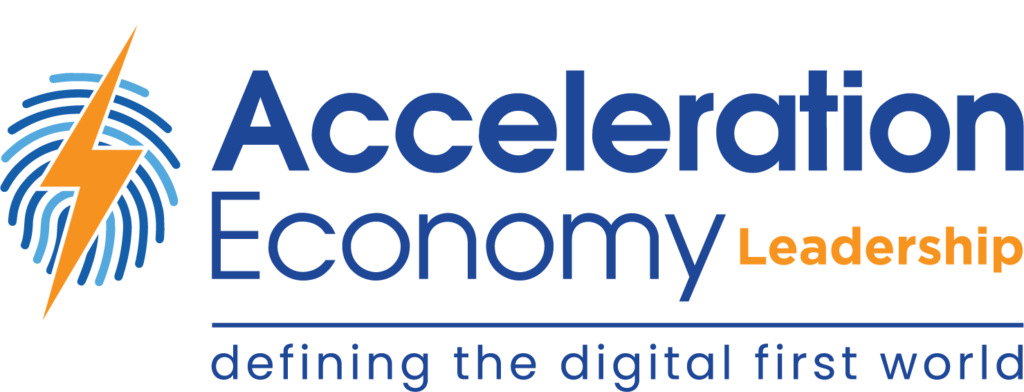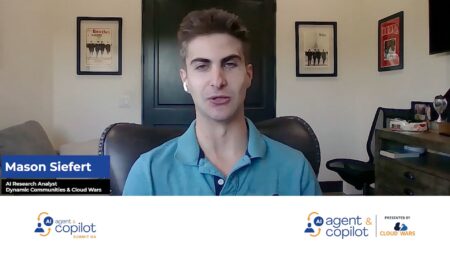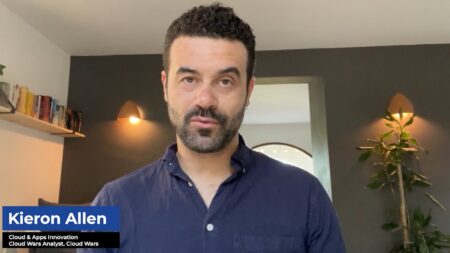In episode 33 of the Growth Swarm podcast, host John Siefert is joined by Bob Evans, Tony Uphoff, and Scott Vaughan. The group explores how the role of a Chief Financial Officer (CFO) is evolving to connect supply chains to demand chains.
Highlights
00:54 — In the most recent episodes of Growth Swarm, the group focused on all that is going on in the world of artificial intelligence (AI). A big thread around the latest AI news reflects the notion of how the jobs of people inside organizations are evolving. What does this mean for the careers that many business leaders have built?
01:10 — In this episode, the group focuses on how the role of a CFO — which has been a foundational part of small and medium-sized businesses — has evolved from a standard financial analysis and related reporting to being a “more strategic seat at the table that helps connect the supply chains to the demand chains.”
01:55 — At Cloud Wars Expo 2022, Luyi Yang, Assitant Professor, Berkely Haas, was one of the first people that John saw “put up a fine point on how technology today can help you win in the trends and issues that are going on with customers, to help you define what the scale of your supply chain needs to be” in order to fulfill customer demand. He notes that this idea seems to represent the future of the CFO, as opposed to just reporting.
02:41 — Tony notes three reasons that CFOs’ jobs are evolving:
- Technology
- Rapid change of pace for business leaders to harness, understand, and react to technology advancements
- The need to make decisions with incomplete data
The role of a CFO today “is a completely different beast,” says Tony. The world is currently witnessing a convergence of supply chains — those that are financial, physical, and digital, as well as those of other suppliers.
05:29 — John agrees with Tony’s reasons and highlights how incomplete data can leave companies “absolutely crippled,” as in the case of Southwest Airlines. The world needs CFOs who are agile and able to think about strategic decisions and shifts in investments.
07:04 — Bob agrees that CFOs must be more agile and nimble in their thinking. This idea is more than “doing things you used to do in a simple way,” but managing things you’ve never seen before, that have more complexities, in a quick and thorough manner. He adds that the evolving role of a CFO, as described by John and Tony, has been “whispered about” in the last few years, but is finally coming to the “forefront of these silos.” Companies are beginning to look at data and future interactions in new, unique, customer-oriented ways, as opposed to internally-oriented ways.
09:12 — John points out the ways that ERP systems have democratized data. Multiple people inside an organization are now receiving valuable information in a decentralized way, which helps break down the silos that Bob described.
10:16 — Scott believes that CFOs are trying to gain the “full view” and bust down silos, adding that “that agility is changing everything.” Now, CFOs are expected to be the connector that builds all of the data from different points, ensuring that “people have the right access to it internally and externally.” He notes that the biggest difference he sees in the role of a CFO is the shift in focus from “reporting and dashboards” to “insights and actions.”
12:22 — AI can help CFOs “pick up some of the pieces” around data or profit and loss (P&L) statements, says John. He asks each co-host for recommendations for CFOs who want to be successful in today’s world.
13:03 — Tony advises CFOs to think about the technology not only in terms of cost structure, but also to truly understand it and its relevancy. CFOs do not need the same tech understanding as a CIO, but they must understand how it can be used to impact their businesses. Additionally, CFOs should get to the point where they can advocate for the breaking down of silos for the sake of achieving a business objective.
14:19 — Bob notes that CFOs should be thinking about company culture — specifically, how they can protect and enhance culture. One of the “shapers of culture” is people. A way to get the right people into the company is through technology.
15:20 — Scott recently spoke with a CFO who explained that CFOs should “build an organization that almost serves as an analyst function within the company.” There are different types of data interpretation that CFOs must adhere to and they must ensure that each one gets to the right people within a company. He encourages CFOs to function less like financial analysts and more like business analysts.
16:29 — John agrees with Scott’s notion about breaking down silos. He adds that the best CFOs understand what customers want and “lead with what the customer wants.” As the role of a CFO continues to evolve, John predicts that this will be a mandatory requirement. Additionally, he adds that it is time for CFOs to “lift their heads up and be a part of the imagination team” of where businesses are going to go.
18:44 — CFOs have a powerful role that has the potential to continue to evolve and be defined. The Growth Swarm podcast brings forth multiple points of view that can impact the big decisions that business leaders within an organization are trying to make.
Want more tech insights for the top execs? Visit the Leadership channel:









